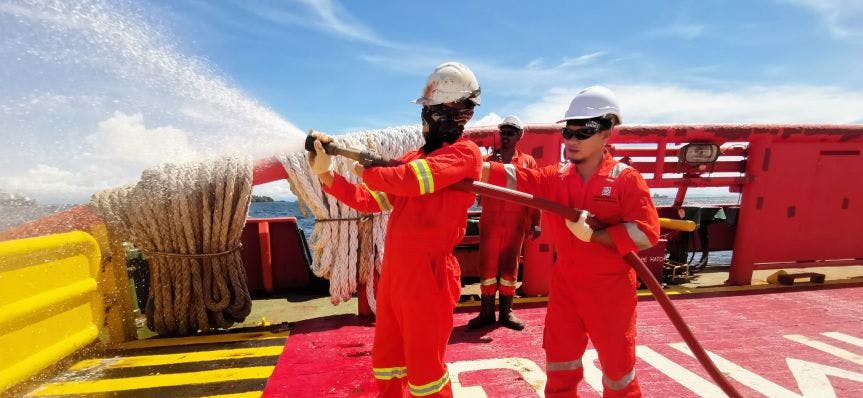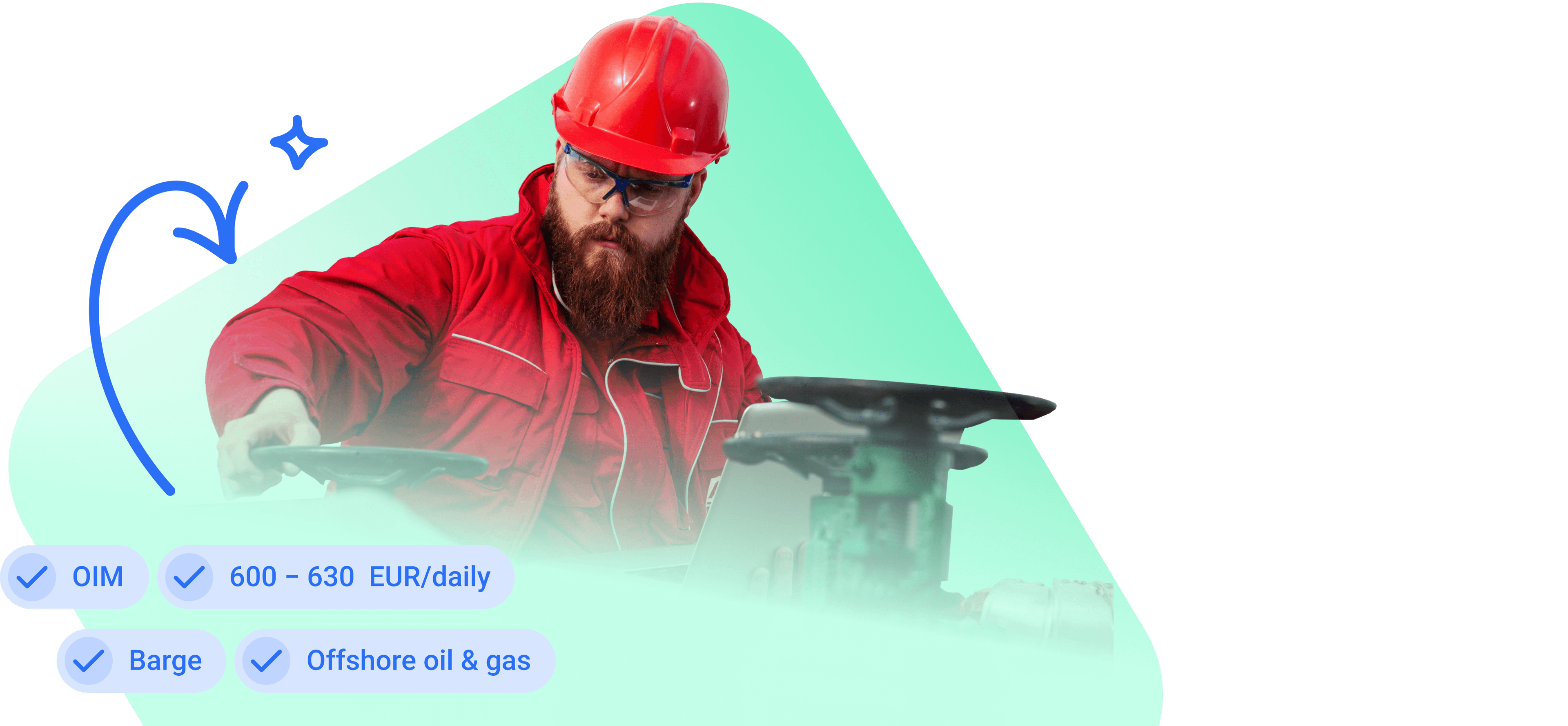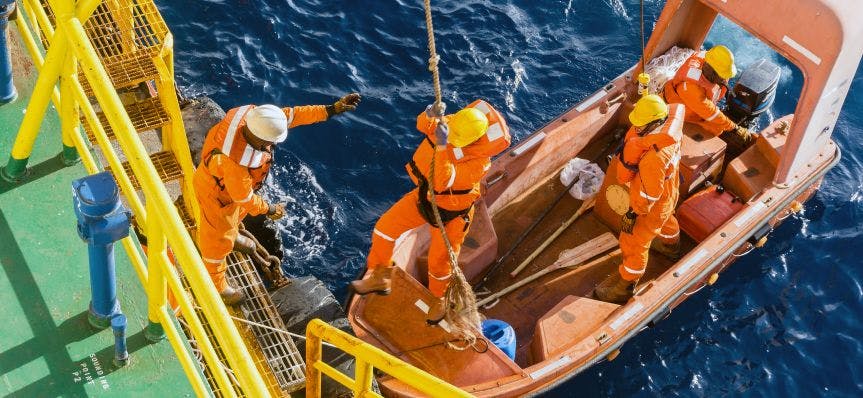Niayesh Sadrzadeh
Content Marketing Manager

Top 10 Essential Skills for a Successful Offshore Career
Whether you've just graduated and are on an exciting new journey or seeking to advance in the dynamic field of offshore work, one crucial factor stands between you and success - skills.
Navigating an offshore job is challenging, unpredictable waters demand more than technical know-how. It calls for a well-rounded skill set, from physical stamina and safety awareness to mental resilience and effective communication. With the right skills, you're not just surviving the offshore life, you're thriving and driving progress.
This comprehensive guide will explore the top 10 essential skills for a successful offshore career, helping you steer your professional journey towards promising horizons.
What Are the Top 10 Essential Skills For a Successful Offshore Job?
1. Safety Awareness
When it comes to working offshore, safety is essential. Offshore environments are high-risk areas, with various hazards like heavy machinery, harsh weather conditions, and potential exposure to hazardous substances. Therefore, it's crucial for anyone embarking on an offshore career to have a sense of safety awareness. Safety awareness encompasses a thorough understanding of safety protocols, an ability to identify potential hazards and a proactive approach to preventing accidents. This includes proper use of personal protective equipment (PPE), safety procedures adherence, and ongoing safety training participation. Furthermore, safety awareness extends beyond just personal safety. It involves creating a safety-conscious environment where everyone looks out for each other's well-being. This can be as simple as pointing out a misplaced tool that could be a tripping hazard or as significant as stopping a job if safety standards are not being met. While safety training is often provided by employers, you can get a head start by educating yourself about common safety practices in the offshore industry. Remember, in the offshore industry, safety awareness is not just an essential skill—it's a way of life.
2. Technical Proficiency
Offshore careers are technically demanding. Whether your role involves operating heavy machinery, maintaining and repairing equipment, or managing complex systems, technical proficiency is paramount. Your ability to apply technical knowledge to real-world challenges is crucial in ensuring operations run smoothly and safely. Technical proficiency is not a one-size-fits-all skill, however. It varies greatly depending on your specific role in the offshore industry. For instance, a bosun needs a deep understanding of deck operations, including rigging and lifting operations, anchor handling, and the maintenance of deck equipment. On the other hand, an offshore driller must be adept at controlling drilling operations, overseeing the rig crew, and ensuring the safety of drilling procedures. To develop technical proficiency, you need to focus on acquiring and refining the skills relevant to your chosen role. This includes theoretical learning and hands-on experience. Regular training, practical assessments, and continuing education are all vital components of this process. By mastering the technical skills required in your specific role, you not only excel in your current position but also open doors for future career advancement in the offshore industry.

3. Physical Fitness
Physical fitness is a non-negotiable requirement for anyone considering an offshore career. The demanding nature of offshore work often involves heavy lifting, long working hours, and a need for stamina to handle the physically rigorous tasks that are a routine part of the job. Being physically fit is not just about being able to perform your duties effectively; it's also a vital safety measure. Good physical health helps you to respond swiftly to emergencies, avoid fatigue-related mistakes, and minimize the risk of occupational injuries. To maintain high physical fitness levels, regular exercise should be a key part of your routine. Activities that build strength, improve endurance, and enhance flexibility are especially beneficial. These might include weight training, cardio workouts, and stretching exercises. For new graduates preparing to venture into the offshore industry, maintaining physical fitness should be a top priority. It's not just about passing the mandatory medical tests, but ensuring you can cope with the physically intensive nature of offshore life. Remember, when it comes to physical fitness in an offshore career, the mantra is clear: Stay fit, stay safe, and excel in your job.
4. Problem-solving Skills
In the unpredictable environment of offshore work, problem-solving skills are essential. Whether it's technical malfunctions, logistical challenges, or weather-related complications, offshore workers often face unexpected situations that require swift, practical solutions. Being a skilled problem-solver in the offshore industry means you can think on your feet, assess situations quickly, and make informed decisions to resolve issues. It involves critical thinking, analytical reasoning, creativity, and the ability to stay calm under pressure. These skills can be honed through experience and ongoing learning. Participate in simulation-based training, learn from seasoned professionals, and always stay curious. Remember, each challenge you encounter is an opportunity to improve your problem-solving abilities.
5. Communication Skills
Effective communication is the backbone of any successful offshore operation. Clear, concise, and timely communication can make all the difference when it comes to performing tasks safely and efficiently. It reduces misunderstandings, improves teamwork, and contributes significantly to overall job satisfaction. In the offshore industry, communication skills extend beyond verbal interaction. Written communication is equally important, especially when it comes to documenting procedures, reporting incidents, or providing shift handovers. Furthermore, understanding and effectively using non-verbal signals can be vital, particularly in noisy environments where verbal communication might be challenging. Remember, good communication also involves active listening. Being able to understand and consider the viewpoints of your colleagues fosters mutual respect and creates a supportive work environment.
6. Adaptability
Offshore work is anything but predictable. Changes in weather conditions, shifts in work schedules, sudden equipment breakdowns—these are just some of the variables you may encounter. In such an environment, adaptability is a critical skill. Being adaptable means you're flexible in your approach to work, open to learning new things, and resilient in the face of change. It allows you to react quickly and efficiently to sudden alterations, minimizing downtime and maintaining productivity. Adaptability is also about cultural sensitivity and interpersonal adaptability. Offshore crews are often diverse, comprising individuals from various cultures, backgrounds, and experiences. Being able to work well with a diverse team is an invaluable trait. Remember, the more adaptable you are, the more valuable you become in the fast-paced, ever-changing offshore industry.

7. Technical Equipment Handling
Technical equipment is at the heart of all offshore operations. From deck machinery to advanced drilling tools, the offshore industry relies heavily on various types of equipment to perform tasks safely and efficiently. As such, proficiency in technical equipment handling is an indispensable skill for anyone in an offshore career. This skill involves not only operating equipment but also understanding its maintenance, troubleshooting processes, and safety protocols. Regular checks and preventive maintenance are vital in ensuring the longevity of equipment and preventing unexpected malfunctions that could pose safety risks or result in operational downtime.
8. Leadership Skills
While not everyone in the offshore industry holds a formal leadership role, leadership skills are valuable at all levels. These skills allow individuals to take initiative, make decisions, manage stress, and motivate others, all of which contribute to a more effective and harmonious working environment. Leadership in the offshore industry isn't just about directing others; it's also about setting the right example in terms of safety and professionalism. Good leaders foster a culture where safety protocols are adhered to, tasks are executed competently, and team members feel valued and heard. In the offshore industry, good leadership contributes to creating a positive work environment where everyone can perform at their best. Even as an entry-level, honing your leadership skills is a worthwhile investment.
9. Time Management and Punctuality
With numerous tasks to be completed within specific timeframes, time management becomes a vital skill for those in the offshore industry. Efficiently prioritizing tasks, allocating resources, and sticking to schedules ensures smooth operations and minimize downtime.
Punctuality, an offshoot of good time management, is equally important. Being on time for shifts, meetings, and safety drills showcases professionalism and respect for the team's collective time and effort.
10. Multicultural Awareness
Offshore platforms and vessels often host teams from various nationalities and backgrounds. Given the tight-knit living and working conditions, understanding and appreciating different cultures is crucial. This skill ensures smoother interpersonal interactions and helps avoid misunderstandings that could arise from cultural differences.
Multicultural awareness also involves recognizing the values, customs, and communication styles of colleagues. This appreciation fosters a more inclusive environment where everyone feels valued and understood.

For those aspiring to land their dream sea job or make the next big move in their maritime careers, Crewlinker is your gateway.
We're here to bridge the gap between dedicated seafarers and top-notch employers. If you haven't registered yet, start today! Our comprehensive guide on "How to Register as a Seafarer on Crewlinker: A Step-By-Step Guide" will ensure a smooth and straightforward process.